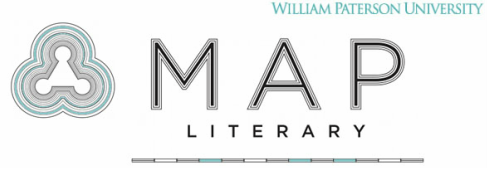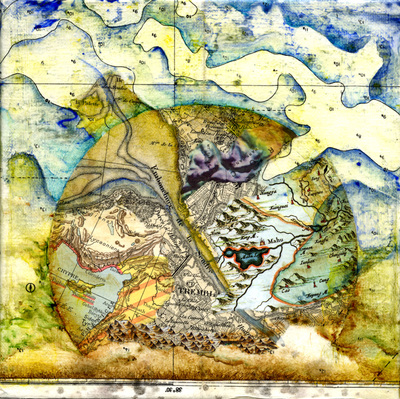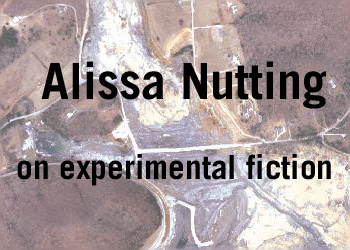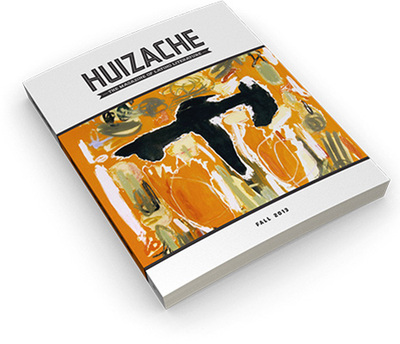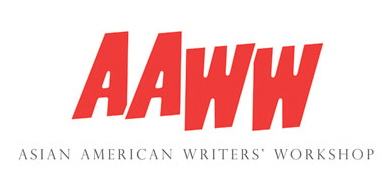ALISSA NUTTING
On Experimental Fiction
Comments given at the Associated Writing Programs conference, Boston 2013
Currently being pregnant has launched me into the curious realm of prolonged sobriety. This is relevant to experimental fiction, to fabulism in particular, because fabulist literature (and literature with fabulist moments) has become all the more essential to me during this time as it is the only drug available to me. When I think about the how of the workings of fabulist fiction, if there is a windsock-style indicator that metaphorically begins to flap in my brain to prove that fabulism is working in any given passage of fiction (what makes it flutter?), I would have to wager the answer lies in transgression—a breach of normalcy so apparent that it transports me from a known, certain space to somewhere intoxicatingly disorienting. Whether this comes through imagery (being asked to picture a scenario that causes our minds to hiccup and gasp and show a multi-hued error screen), or through a stylistic device like repetition (a text hypnotizing me into an altered state with a new erratic beat all its own) fabulism, I believe, aims to get you a little high.
I write experimental fiction for the same reason I read experimental fiction—which is the same reason people ingest peyote and ayahuasca and large amounts of Robitussin that exceed the standard dosage—I want to see something I’ve never seen before, and go someplace beyond the limits of natural reality. I want to sweat and maybe even vomit. I want to purge the bored, dead spaces in my brain. The banal experiences of life (doing taxes, waiting for sliced turkey at the deli counter), if allowed to build up inside of us, are highly toxic. Reading and writing fabulism is a way of cleaning house and saying, “What if what’s true wasn’t true? What then?” and it opens up a never-before-used space of possibility in your brain. It’s like moving from a used, dirty cage into a pristine one, filled with new food troughs you’ve never eaten from and corners you’ve never defecated in. It can make life seem unconsidered in a very revitalizing, relieving way. There’s more to think about! I’ll sigh; There is so much more to think about.
It’s therefore unsurprising that the challenge of writing experimental and fabulist fiction, for me personally, comes in sometimes getting journey-wary. Like any cross-country trucker or traveling salesman knows, constantly roving out into the uncharted can be daunting work. There are times when I want to grip tightly to the familiarity of convention, to plot a traditional circular narrative, to have the assurance that I know the way home. To write experimental fiction is to constantly be Gulliver, unsure of what territory you’ll end up in next. But this is also the pleasure of writing it, particularly from an existential viewpoint. It’s a way for me to continually surprise myself and keep from getting sick of having myself as a lifelong roommate. It’s a more variegated way of being in the world.
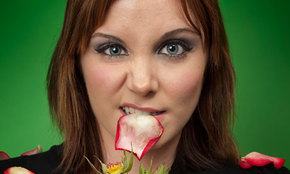
Alissa Nutting’s debut novel, Tampa, was published by Ecco/HarperCollins in 2013. She is author of the short story collection Unclean Jobs for Women and Girls (Starcherone/Dzanc 2010), which won the Starcherone Prize for Innovative Fiction judged by Ben Marcus. Her fiction has or will appear in publications such as The Norton Introduction to Literature, Tin House, Bomb, and Conduit; her essays have appeared in Fence, the New York Times, O: The Oprah Magazine, and other venues. An assistant professor of creative writing and English literature at John Carroll University, she lives in Ohio with her husband, her daughter, and two spoiled tiny dogs.
